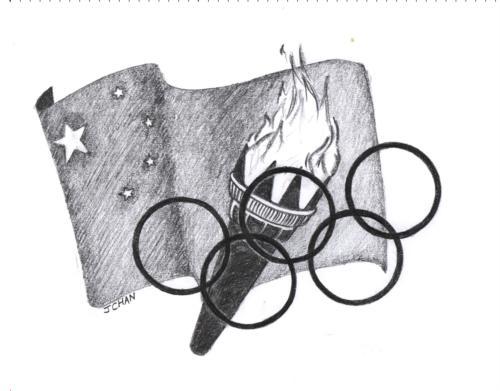
News
Pro-Palestine Encampment Represents First Major Test for Harvard President Alan Garber

News
Israeli PM Benjamin Netanyahu Condemns Antisemitism at U.S. Colleges Amid Encampment at Harvard

News
‘A Joke’: Nikole Hannah-Jones Says Harvard Should Spend More on Legacy of Slavery Initiative

News
Massachusetts ACLU Demands Harvard Reinstate PSC in Letter

News
LIVE UPDATES: Pro-Palestine Protesters Begin Encampment in Harvard Yard
For the Love of the Games
Instead of boycotting the Beijing Olympics, athletes should take advantage of the podium

Last week, as protesters waved “Free Tibet” signs and “Genocide Olympics” banners in Harvard Square, the Olympic torch began its journey around the world. As Beijing officials prepare to welcome both the Games and the world on August 8, activists from across the globe are stepping up calls for countries to boycott the Games. Yet such calls are both unrealistic and futile in effecting positive change—not only does a boycott fail to improve the plight of those affected by China’s actions, but such a step does, in fact, concretely harm the athletes themselves and the symbolism of brotherhood and harmony advanced by the Olympic Games.
When Beijing won the bid to host the 2008 Olympic Games, the decision was certainly controversial, but many hoped that the pressure of international scrutiny would spur reform within the totalitarian nation. Yet even as China has constructed arenas, stadiums, and playing fields, positive steps towards a heightened respect for human rights have yet to materialize. In addition to English lessons and etiquette campaigns (don’t spit, don’t slurp, line up politely), Chinese officials have also razed neighborhoods and evicted citizens, arrested foreign reporters, tightened control in Tibet, and increased military cooperation with Sudan. Undoubtedly and unfortunately, the potential for human rights improvement as a consequence of the Olympic spotlight has not been realized.
The United States, European Union, and other national sports officials have unequivocally denied the possibility of a 2008 boycott, however. They and others rightly point out that the greatest burden of Olympic boycotts fall upon the shoulders not of the host country, but of guiltless athletes. For example, the American athletes who were barred from competing in the 1980 Moscow Games as a result of the U.S. boycott were asked, in then-Vice President Walter Mondale’s words, “to pay a price that couldn’t be repaid,” while the Soviet Union’s ensuing boycott of the 1984 Los Angeles Games hardly had the humiliating consequence the Soviets hoped for, as the world witnessed the most commercially and financially successful Games in history.
Rather than outright non-participation, the pedestal of the games should be used to cast a vivid spotlight on their locale, as has been done in the past. In Mexico City in 1968, when Tommy Smith and John Carlos raised their fists on the medal podium, the resulting image awakened the world to American racial injustice. In Sydney, the naming of Aboriginal track star Cathy Freeman as torch bearer and her meteoric rise in media popularity brought to light the horrors of the Australian government’s genocidal actions against its Aboriginal population.
Coupling awareness of Chinese atrocities with Olympic media coverage—which has brought a geopolitical gaze to the sports pages—has been, and can continue to be, an effective strategy for activists working on behalf of Tibet, Sudan, and other causes. But it is realistic activism, not wanton calls for boycotting, that should now anchor these efforts. Pressuring sponsors, media corporations, and other parties involved in the Games to communicate concerns about Chinese financial links to Sudan; highlighting the dark side of Chinese political activity to potential commercial parties; dispersing information about human rights violations as widely as possible; strategizing means for fans and athletes (whose ability to express political opinions is limited, the result of Olympic charter and U.S. Olympic policy) to participate in activist efforts—these and other tactics can be steps in the direction of protesters’ underlying goals.
As the opening ceremonies draw ever closer, we wish athletes and activists alike the best in chasing their Beijing goals. “One world, one dream,” the official 2008 slogan reads—and a thousand spotlights, a thousand gazes, and a thousand opportunities for change.
Want to keep up with breaking news? Subscribe to our email newsletter.
